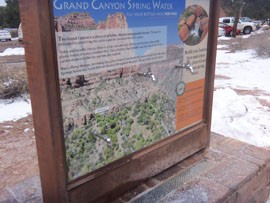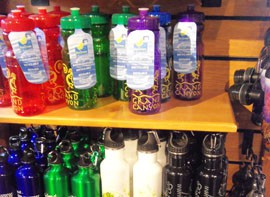Cronkite News has moved to a new home at cronkitenews.azpbs.org. Use this site to search archives from 2011 to May 2015. You can search the new site for current stories.
To cut waste, Grand Canyon National Park banning sales of bottled water
GRAND CANYON NATIONAL PARK – Like so many others who visit the Grand Canyon each year, Jennifer and John Stambaugh of Illinois toted bottled water as they took in the views recently.
These bottles came from the tour company that bused them here from Las Vegas, but many visitors buy bottled water from shops in the park.
Concerned about the volume of plastic bottles in recycling bins and trash cans, not to mention discarded along roads and trails, the National Park Service is banning bottled water sales here as of March 10. The Stambaughs were unaware of that plan, but it made sense to them.
“If it cuts down on the landfills and trash, we support it,” Mrs. Stambaugh said. “We use so many as a nation, every place you look has bottled water and people are buying it, and using it and people don’t self-recycle.”
Free water stations have been installed in high-traffic areas throughout the park. For those who don’t bring their own containers, concessionaires offer reusable bottles for less than $2.
Although many visitors dispose of plastic responsibly, even in recycling bins water bottles are problematic, said Shannan Marcak, a park spokeswoman.
Plastic bottles account for 20 percent of the park’s solid waste and a third of its recyclables.
“The volume, particularly of plastic bottles, particularly of plastic water bottles – the volume in our waste stream was growing,” she said.
And then there are the caps and labels removed from water bottles. Those rank along with cigarette butts as the top items park staff clean up on the grounds.
When tossed along trails, bottles, caps and labels can harm wildlife in addition to ruining the park’s pristine look, Marcak said.
“People see it, it kind of decreases the value of the view to them,” she said.
Nancy and Doug York, who were visiting the park for the first time from Ontario, Canada, also worried about what becomes of water bottles.
“Where are they going to put them?” Mrs. York said. “A lot of people, rather than carry them out, will chuck them, they don’t care where.”
Similar policies are in effect at Zion National Park in Utah and Hawaii Volcanoes National Park.
The park service conducted a 14-step analysis to determine how banning bottled water sales would benefit or hinder Grand Canyon National Park. It considered factors including the availability of water stations and water fountains, along with health concerns and the impact on vendors.
Xanterra Parks & Resorts, the concessionaire at the Grand Canyon, Zion, Yellowstone and Mount Rushmore, among other national parks, supports the decision to eliminate bottled water sales at the Grand Canyon, said Chris Lane, the company’s vice president of environmental affairs.
“We’re a deep-green company,” he said in a telephone interview from Denver. “We wouldn’t be in national parks if we weren’t a radically green company.”
Xanterra has accepted that the change will cost some sales revenue, Lane said, but hopes that sales of reusable containers will help offset this.
“The theory is that you can buy a $2, one-time, single-use plastic bottle of water, or a $5 or $6 reusable container that you can use again and again,” he said. “We can make revenue that way.”
The National Park Service understands that these adjustments will require some thought and changes in behavior but hopes visitors will appreciate the commitment the park has made, Marcak said.
“The National Park Service as a whole is really trying to take a leadership role in environmental achievement and trying to exemplify, for the public, behaviors that are fairly easy for them to adapt in their own lives that are environmentally sound,” she said.









